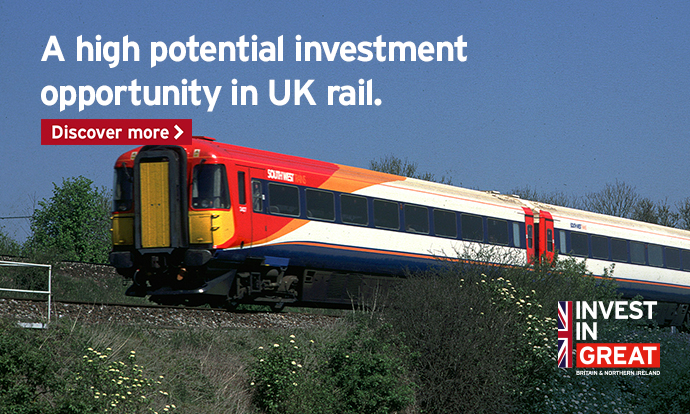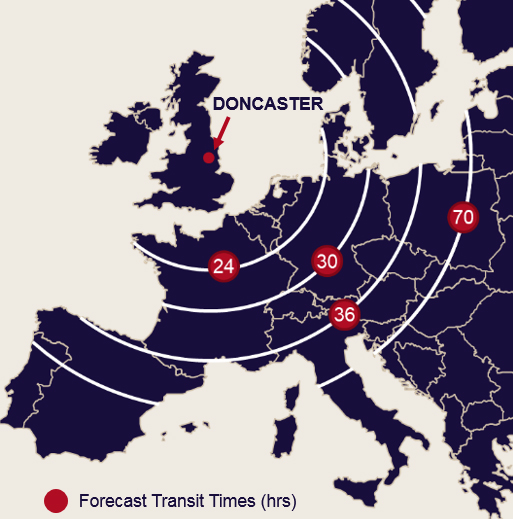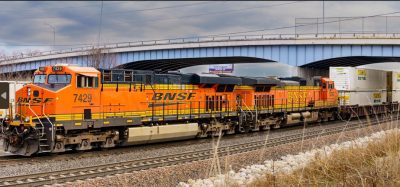Vibrant rail sector makes the UK an attractive home for overseas investors
Posted: 4 October 2018 | Global Railway Review | No comments yet
The UK currently has a national rail infrastructure pipeline worth £88 billion, which is the greatest investment in the sector in over a century. As a result of these unprecedented levels of investment, significant opportunities exist for investors to support and add value to the rail supply-chain.


UK rail operators are seeking to procure approximately £35 billion of new equipment and services over the next 15 years. To achieve this, the supply-chain industry must expand by 140 per cent. Playing a part in this is Doncaster – a town in Yorkshire, northern England – that is fast establishing itself as a rail ‘hub’ and attractive location for investors to grow and connect to businesses with great opportunities in rail. The UK’s Department for International Trade (DIT) exists to help businesses willing to capitalise on the UK’s strength in rail.
The opportunities
There are a vast number of significant opportunities available to willing, international investors. For example, in the UK, the average age of freight rolling stock is 25 years and increasing, so there is a clear requirement to bring new and modern freight rolling stock into use.
There’s further opportunity to ‘plug’ supply-chain gaps – for instance, almost £600 million worth of rolling stock products were imported from outside the EU alone in 2016 (see Table below).
| Top rail imports (Non-EU) | Value £m 2016 |
| Self-propelled railway coaches | 401 |
| Parts of locomotives or rolling stock | 93 |
| Containers for the transport of fluids | 65 |
| Railway maintenance vehicles | 20 |
| Railway track fixtures and fittings | 7 |
With major capacity-enhancing infrastructure projects in the pipeline such as High Speed 2, the biggest engineering project in Europe, further opportunities lie in being able to complement and partner with key suppliers, giving the chance to identify supply-chain gaps or manufacturing deficits, or introduce new technologies that can benefit the rail industry.
HS2 will be the world’s most advanced passenger railway and the new backbone of Britain’s rail network. Over 2,000 business have already won work with HS2 – the programme will span over 15 years and offers thousands of opportunities for companies operating across the entire supply chain.
Why the UK? Why Doncaster specifically?
Network Rail – the owner and infrastructure manager of most of the rail network in the UK – has an approved spend of £48 billion for the 2019-2024 period. The UK already offers an integrated supply-chain and a skilled rail workforce. The UK’s investment in rail is the highest in Europe – with over £5.3 billion being spent on mainline rail per year; this is £1.76 billion more a year in rail investment than France – the UK’s nearest competitor.
Alongside York and Derby – two locations not far from Doncaster with significant rail expertise – Doncaster itself is now providing an ideal location to access opportunities in rail.
Not only has rail engineering, manufacturing and rolling stock maintenance been a major part of Doncaster’s economy for over 150 years, but growth in the region now means a rail cluster has emerged comprising 50 companies and 8,000 employees.
Leading international rail firms such as Volker Rail, Freightliner, Unipart Rail and DB Schenker all operate out of Doncaster providing a highly-integrated supply-chain into which investors can easily fit.
Skills and research
The National College for High Speed Rail has a brand-new £25 million state-of-the-art campus in Doncaster. Built to educate the rail specialists of tomorrow, the College offers high level vocational courses to over 1,000 students, ensuring a pipeline of appropriately skilled, work-ready talent. Furthermore, the College is home to more than 20 major rail companies specialising in traction, rolling stock, advanced manufacturing, infrastructure, and power supply and distribution.
In addition to the National College for High Speed Rail, local universities including Sheffield, Sheffield Hallam and Huddersfield – each with rail-specific courses and world-class research facilities – are contributing to providing the right talent now and ensuring a steady pipeline of graduates educated for the rail sector.
The rail industry will collaborate to deliver a highly-skilled, diverse and flexible workforce, to support the creation of apprenticeships and to promote rail as a high-tech and dynamic industry. Rail Sector Skills Delivery Plan.
Logistic networks
With close proximity to Manchester Airport and Doncaster Sheffield Airport, five major motorways and a major railway station on the UK’s high-speed, north-south main line, Doncaster’s location at the heart of the UK provides easy access to supply leading European markets and beyond (see map below).


Sitting at the heart of the UK’s intermodal supply-chain, iPort is a six-million square-foot development on the outskirts of Doncaster with a rail-connected terminal specialising in intermodal freight transport. This hub is designed to provide the most efficient and cost-effective supply chain solutions, linking suppliers via air, sea and land transportation via rail and road locally, nationally and internationally. iPort is the UK’s ideal intermodal freight solution, creating new business opportunities by supporting integration between suppliers and customers.
Names such as Amazon, Fellowes, Lidl and Ceva Logistics are already committed or onsite at iPort, one of the largest commercial developments with planning permission in the UK.
The other advantages
A recent comprehensive industry insight carried out by the DIT has identified several key cost drivers for rail manufacturers, with findings to show that the UK and Doncaster provide a competitive package against other leading European locations.
Alongside competitive electricity rates, property costs and cost-effective salaries compared to Europe, investors can rely on significant support from Government and local partners.
“Doncaster gives us the best opportunity in terms of existing infrastructure and engineering prowess,” Carl Garrud, Managing Director, Rhomberg Sersa.
Furthermore, the DIT can provide access to networks that can help influence and connect investors to companies that are already flourishing in Doncaster and throughout the UK. The UK has a vibrant rail industry network offering support and advice, including the Office of Rail and Road (ORR), the Rail Alliance, the Rail Delivery Group, the Rail Safety and Standards Board and many more.
The DIT can also provide case studies of companies that are already operating successfully out of Doncaster including Rhomberg Sersa (an Austrian/Swiss rail engineering service provider), Wabtec Corporation (a leading U.S. supplier of value-added technology-based products and services), Unipart Rail (supplier of rail products and installation materials, plus consultancy and technical support) and Hitachi Rail Europe (a global provider of total railway solutions and key company in delivering the UK’s next generation of rolling stock).
The UK government offers a package of assistance and incentives to help a companies based outside of the UK to set up in Doncaster and exploit this unique, billion-pound opportunity. You will be quickly connected to suppliers, customers and companies already benefiting from the region’s strengths, and receive tailored guidance on visas, recruitment and access to funding. It’s time to find out how you could capitalise on this £88 billion investment pipeline and be part of a market that will grow for years to come.
Please visit our website to find out more and register your interest.
Sources
- Infrastructure & Projects Authority – Analysis of the National Infrastructure and Construction Pipeline
- Some values converted from Euros
- uktradeinfo.com
- Frost & Sullivan – Investment in Rail Infrastructure and Rolling Stock in Europe – June 2015
- http://iportuk.com/
- BRES
- Electricity – BEIS data 2016 on industrial prices including tax; Property – FDI Benchmark; Salaries – ERI Salary Expert
Related topics
Related organisations
DB Schenker AG, Department for International Trade (DIT), Freightliner, Hitachi Rail Europe, HS2 Ltd (High Speed Two), iPort Rail, National College for High Speed Rail, Network Rail, Office of Rail and Road (ORR), Rail Alliance, Rail Safety and Standards Board (RSSB), Rhomberg Sersa, Unipart Rail, Volker Rail, Wabtec Corporation








